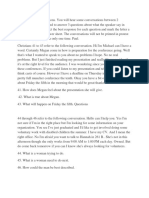0% found this document useful (0 votes)
95 views4 pagesAssignment 2. The Telegram 2025
In 'The Telegram' by S. J. Simon, the protagonist seeks advice from Briggs on how to effectively send a telegram to his wife. Briggs critiques the original message, suggesting numerous cuts to save money and improve clarity, ultimately leading to a humorous realization that the telegram may not be necessary at all. The story highlights the art of concise communication and the absurdity of overthinking simple tasks.
Uploaded by
ВечнаяCopyright
© © All Rights Reserved
We take content rights seriously. If you suspect this is your content, claim it here.
Available Formats
Download as DOCX, PDF, TXT or read online on Scribd
0% found this document useful (0 votes)
95 views4 pagesAssignment 2. The Telegram 2025
In 'The Telegram' by S. J. Simon, the protagonist seeks advice from Briggs on how to effectively send a telegram to his wife. Briggs critiques the original message, suggesting numerous cuts to save money and improve clarity, ultimately leading to a humorous realization that the telegram may not be necessary at all. The story highlights the art of concise communication and the absurdity of overthinking simple tasks.
Uploaded by
ВечнаяCopyright
© © All Rights Reserved
We take content rights seriously. If you suspect this is your content, claim it here.
Available Formats
Download as DOCX, PDF, TXT or read online on Scribd
/ 4


















































































